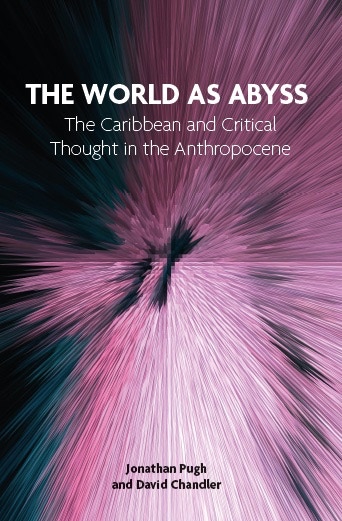Abyssal Geography
Today, we are held to live in the Anthropocene, bringing to an end binary imaginaries, such as the separation between Human and Nature, and with them Western modernist assumptions of progress, linear casuality and human exceptionalism. Much Western critical theory, from new or vital materalism to post- and more-than-human thinking, unsurprisingly reflects this internal crisis of faith in Eurocentric or Enlightenment modernity and modern reasoning.
For Abyssal Geography, after Fanon, the world violently forged into the global colour line is bifurcated via the construction of the modern subject, capable of reading itself as a subject in the world and through Human Geography and related fields of study. In this always already antiblack world, the goal of ‘Abyssal Geography’ is not to continue worlding the modern subject in new ways, but to analyse and critique the mechanisms and shifts in critical thought through which Human Geography and related fields continue to salvage and to redeem the purchase of the modern subject and the world.
Thus, we are expanding the ‘Anthropocene Islands’ project, including new workshops, study groups and sessions at conferences. Readings will also feed into the monthly Anthropocene Islands reading group.
If you are interested in being involved please contact Jonathan.Pugh@ncl.ac.uk and/or d.chandler@westminster.ac.uk
Some of our initial thinking can be found in the below open access publications.
the Caribbean and Critical Thought in the Anthropocene available here
Endorsements for The World as Abyss: the Caribbean and Critical Thought in the Anthropocene
"For some time now scholars have questioned the overly general assumptions about the ‘anthropos’ of the Anthropocene, but much work needs to be done to flesh out what a decolonized Anthropocene might be. Pugh and Chandler’s The World as Abyss provides an original, intriguing and compelling counterpoint to bland Anthropocene humanism (and posthumanism). This timely work explores the poetics of the Caribbean and provides a way to think about the Anthropocene and the future beyond the managerialism of the present. This book is essential reading for those working in the environmental humanities or Anthropocene studies." Claire Colebrook, Edwin Erie Sparks Professor of English, Philosophy and Women's Gender and Sexuality Studies, Penn State University
"The World as Abyss names an apocalypse that began long ago. Pugh and Chandler patiently follow the journey of thought as it travels from the Middle Passage to the Caribbean. This brings them face-to-face with the horror of anti-Black violence, not as just another resource to strip-mine, but as an unavoidable abyss that confines all thought. Its reminder: that we have still not yet begun to think a truly Black world." Andrew Culp, Professor of Media History and Theory, California Institute of the Arts
"How is it that ontology has come to be seen as the antidote for modernity? While Foucault denigrated ontology as a mistaken and parochial exercise, contemporary social theory holds out the promise that new modes of planetary knowledge will save us from our own excesses. Drawing together long traditions in Caribbean scholarship with Afro-pessimist thought, Pugh and Chandler illustrate how the search for more emancipatory ontologies - relational ontologies, indigenous ontologies, non-human ontologies, etc. - not only misunderstands the problem of modernity but (more importantly) works to veil the negative force that marks both the limit and cause of all such knowledge practices: what they term the abyss. To engage in abyssal thought – as they lay out – is to inhabit a site of refusal: a determination not to be drawn into the lure of ontological ‘correction’ and to recognise that the practice of world making cannot not bear the imprint of colonial violence. Articulated in passionate declarative prose, these authors powerfully illuminate the trap of the emancipatory instinct and the promise of a deconstructive ethic." Mitch Rose, Senior Lecturer in Human Geography, Aberystwyth University
"With the force of a manifesto, the intensity of a polemic, and the nuance of a treatise, Pugh and Chandler’sThe World as Abyss sets out to disavow the disavowal of Colonial violence in the making of the contemporary world and thought. Learning from Caribbean thinkers, writers, and poets,The World as Abyss sets to work unworking, desedimenting and deconstructing, the violent ontological foundations by which anti-Black worlds maintain and reproduce their innocence and ignorance. Replaying and reiterating, extending and multiplying, gestures of refusal – refusals of subjection, of History, of Geography, of meaning, of Being –there is the refusal of the World as it is and of the World as it could be.The World as Abyss artfully combines a critique of the historical forces which make and unmake the contemporary moment with the suspension of horizons, of ends, of grounds. What emerges in the wake is an intensification of the generative capacity of this refusal; voids, arrhythmia, counter-times, displacements, dislocations, the abyssal. First as threat and then as promise". Paul Harrison, Associate Professor of Human Geography, Durham University, UK
The World as Abyss gives Caribbean thought and culture the place they deserve within critical theory and materialist studies. Mónica Fernández Jiménez
Some more extended reviews:
Thomas Dekeyser’s open access review of ‘The World as Abyss’ in the journal Postcolonial Studies
Lateral: Journal of the Cultural Studies Association
Geneve Phillip-Durham. The World as Abyss: The Caribbean and Critical Thought in the Anthropocene. Small States & Territories Journal
Additional Open Access Papers
Jonathan Pugh interviewed by Barbara Gföllner ‘The Americas: a Relational or Abyssal Geography?’,
Journal of Transnational American Studies.
Interstitial and Abyssal Geographies (published in Political Geography)
Relational or Abyssal? (published in Political Geography)
